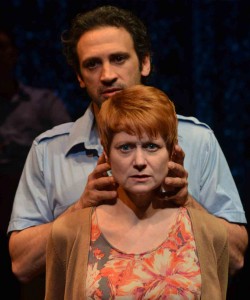The Israeli Arab, Ali Said, says that he met Eileen in the hallway of the Mayfair Hotel; in his account, their eyes met and they went into a room for wild sex. “I’m a wonderful lover. She enjoyed herself,” Ali informs his interrogator, Dov (Ezra Barnes). Not so, Eileen tells Dov in a separate interview. She met him in the park, where he approached her and began a conversation, though it did indeed end in intercourse. She was a virgin, even at fortysomething. No, says Ali, she was definitely not a virgin.
Lucile Lichtblau's play The English Bride is a compact, fascinating play about what we know about people — what anyone can know — and what lies folks will tell and even believe to keep their lives under control. This exercise among three liars, which recalls the classic film Rashomon, is based on a 1986 incident in which a Muslim Arab was arrested for attempting to blow up an El Al flight in Britain. As Dov, an Israeli Mossad agent, interviews the accused bomber and the woman who loved him, he has no qualms about employing lies to find the truth. The structure, a collection of monologues and two-person scenes that unfold as Dov tries to separate the truth from lies, is admirably lean and vigorous in the hands of director Carl Wallnau.
As the meeting and deepening relationship between Ali (Michael Gabriel Goodfriend) and Eileen (Amy Griffin) is recounted, the story appears straightforward. She and Ali have small disagreements — will the child she’s carrying be a boy or a girl? Will it have Eileen’s fair complexion or Ali’s darker skin? Will she agree to wear a veil? Wallnau makes sure that Lichtblau’s plot, which snakes around on itself, delivers all the surprises forcefully — a woman in the audience gasped involuntarily in the last minutes as an important plot point proved shockingly bogus.
Griffin, in the title role of an unprepossessing refugee from the northern British city of Leeds, sports a persuasive regional accent. Eileen talks confidently but masks the desperation of a woman on the cusp of middle age and fleeing a miserable life with a depressing family. Ali’s attraction to her is different from that of other men, she says. “He was different,” she tells Dov. “With him, I always believed down deep he meant what he said even though I never let on to him that I believed him,” adding “my mum used to tell me ‘never trust a man who smiles.’” The last is a nice touch, a suggestion of painful family life and past close-mindedness, and Lichtblau’s understanding of her characters is reflected by several such small moments. One can accept those as facts, but so many others about Eileen are offered and rescinded that one’s head may spin by the end.
Nor is Eileen's story the only fluid one. Ali, played by Goodfriend with initial hostility and then canny charm toward his questioner, is never what he seems. The action, set in interrogation rooms, the park, an airport and elsewhere, is served well by Bob Phillips’s design: three different levels set in a corner, with a bench on each of the side levels. The whole area is backed by a curtain of interlocking paper loops resembling a chain link that one finds usually in doorways; here they provide a stunning pattern for Joyce Liao to cast her evocative lighting.
Said, invested with confidence and much courtliness by Goodfriend, is a handsome man who claims he picked up Eileen in the hallway of the hotel where she works, but who denies attempting to blow up an airplane. Yet, although a bombing is central to the plot, Lichtblau forbears demonizing Ali and only occasionally makes a reference to the political situation in the Middle East. After Eileen learns that Ali is an Arab, she says, “I didn’t know Arabs lived in Israel,” and he answers, “that’s something the Israelis have trouble with as well.” The play avoids emphasizing the hot-button topics of the political crisis in favor of the personal relationship of the couple, although Ali’s motivation for the crime he is accused of draws inevitably on politics. Indeed, there is a clash of the personal with his political motivation as Eileen reveals she is pregnant and slowly one realizes that Ali expects Eileen to wear a veil and raise the child as a Muslim, though she wants to raise it Catholic.
As Eileen and Ali offer Dov their divergent perspectives, they move together and enact the scenes in the way that whichever principal is speaking remembers. And although Dov listens, he knows from experience that he has to sift for the truth. “She’s a born liar,” he says, after Eileen misidentifies someone. “Most people are,” he adds, “myself included.” Barnes finds the cool aloofness in Dov as well as the confidence of someone used to the upper hand — which may also be a subtle reflection of the political landscape. A play touching on any aspect of the Middle East cannot fail to seem familiar at times, but Wallnau manages to keep that sense fleeting as he strips layer after layer of mendacity to help the audience reach — what? Not the truth, but a murky approximation of it.
The English Bride plays at 59E59 Theater through Nov. 17 on the following schedule: Tuesday-Thursday, 7:30 p.m.; Friday at 8:30 p.m.; Saturday at 2:30 and 8:30 p.m.; Sunday at 3:30 and 7:30 p.m.



